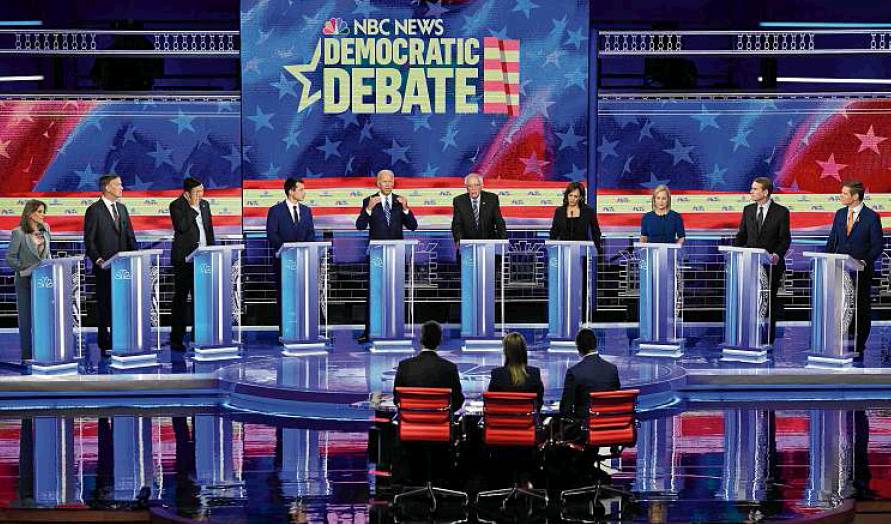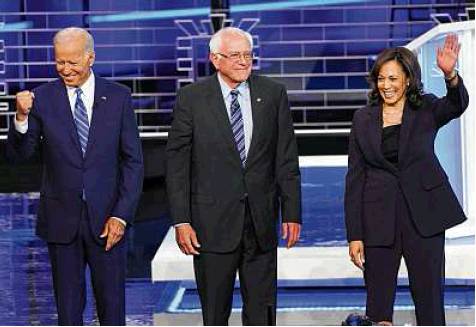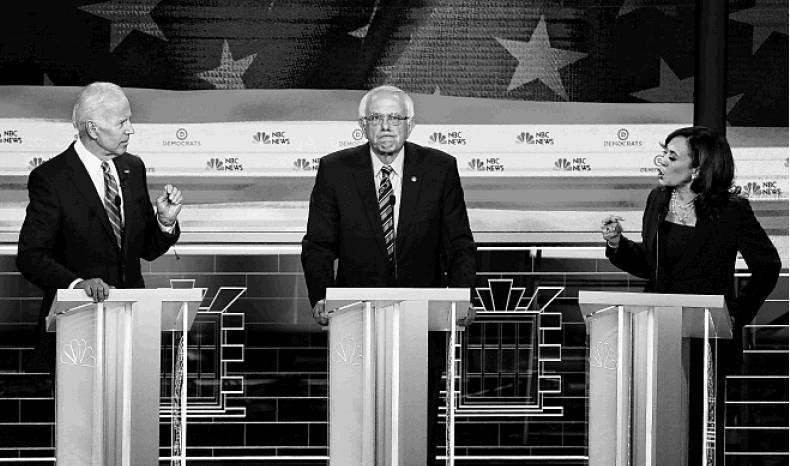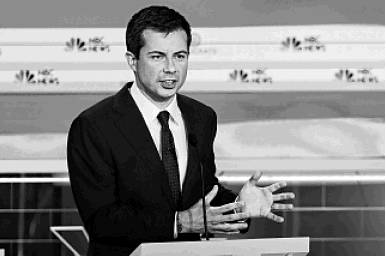ELECTION 2020
HEAVYWEIGHTS COME OUT SWINGING
Biden goes on the defensive as candidates spar over party’s ideological policies in Round 2 of Democratic debates
By Jonathan Martin and Alexander Burns NEW YORK TIMES
MIAMI— Joe Biden repeatedly found himself on the defensive in the Democratic debate on Thursday over his record as well as his personal views, with the most searing moment of the forum, and the primary campaign to date, coming when Sen. Kamala Harris confronted him over his comments on working with segregationist senators.
Biden, the Democratic front-runner participating in his first major debate in seven years, was at times halting and meandering, but also forceful in pushing back on criticism of his record. Those attacks included a call for the 76-year-old former vice president to “pass the torch” to a younger generation, as well as questions about his positions on universal health care and deportation.
But the most dramatic confrontation was not over policy or ideology but personal history. Peering down the stage to look at Biden directly, Harris assailed Biden for remarks he made this month invoking his work in a Senate that included a pair of notorious segregationists. She then went further, recalling that he also had opposed school busing in the 1970s.
“There was a little girl in California who was a part of the second class to integrate her public schools and she was bused to school every day,” said Harris. “And that little girl was me.”
Biden responded indignantly, calling her attacks “a mischaracterization of my position across the board” — and then returned fire at Harris, who has faced criticism from the left for her record as a prosecutor in California.
“If we want to have this campaign litigated on who supports civil rights and whether I did or not, I’m happy to do that,” he shot back. “I was a public defender; I didn’t become a prosecutor.”
The exchange marked the tensest moment in the first Democratic debates, which were split between Wednesday and Thursday to accommodate the party’s sprawling field. And they illustrated both Biden’s vulnerability and the urgency his rivals feel to start sowing doubts about his candidacy with Democrats who mostly view him as former President Barack Obama’s vice president.
At a moment when President Donald Trump has inflamed the country’s racial divisions, the clash also went to the heart of the Democrats’ debate over whom to nominate. Should they put forward a moderate who could appeal to some of the white voters who elected Trump but who also carries baggage from an earlier political era? Or would they be more likely to win by energizing younger and nonwhite voters with a candidate like Harris, whose father is black and mother was of Indian descent?
Harris’ offensive also represented an effort to jump-start her campaign, which started with great promise in January but has flagged as she has wrestled with whether to run as a progressive or appeal to her party’s moderate wing. Biden’s initial advantage in the Democratic contest is attributable in part to his strong backing from African Americans — votes Harris needs to win to secure the nomination.
It was not on matters of race alone that Biden found himself under biting attack. When Biden delivered a laudatory account of his own skills as a congressional negotiator, boasting that he had coaxed a tax hike out of the Senate majority leader, Mitch McConnell, the former vice president earned a swift rebuke from a fellow moderate, Sen. Michael Bennet of Colorado.
“The deal that he talked about, with Mitch McConnell, was a complete victory for the Tea Party,” Bennet said, arguing that Biden had made foolish concessions to Republicans on government spending without getting much in return. “That was a great deal for Mitch McConnell. It was a terrible deal for America.”
And without condemning Biden by name, Sen. Kirsten Gillibrand, too, rejected his deal-making ethos and called attention to his history of taking more conservative positions on abortion rights — including his past support for a ban on federal funding for abortion, known as the Hyde Amendment. Biden renounced his support for the measure only earlier this month.
“When the door is closed, negotiations are made, there are conversations about women’s rights and compromises have been made on our backs,” said Gilli-brand, D-N.Y. “That’s how we got to Hyde. The how the Hyde Amendment was created — a compromise by leaders of both parties.”
If Biden spent much of the debate on defense, so at times did the ascendant left wing of the Democratic Party, as a group of moderates led by Biden raised doubts — and repeatedly expressed something verging on alarm — about Democrats’ embrace of the far-left ideas pioneered by Sen. Bernie Sanders of Vermont.
Biden rejected Sanders’ demand for a single-payer health care system and said that seeking to expand coverage more incrementally was the more pragmatic approach. Two lesser-known rivals, Bennet and former Gov. John Hickenlooper of Colorado, warned more ominously that Sanders and others who espouse his ideology could damage the Democratic Party and the country’s economy.
“If we don’t clearly define that we are not socialists,” Hickenlooper declared, “the Republicans are going to come at us every way they can and call us socialist.”
And Mayor Pete Buttigieg of South Bend, Ind., raised reservations about creating new universal college tuition benefits, suggesting they could end up providing unneeded financial support to wealthy students.
Yet Sanders had ample company onstage from Democrats aligned with his vision for health care and much more, including Harris of California and Gilli-brand, both of whom raised their hands to endorse the replacement of private care with a “Medicare for all” system.
For his part, Sanders defended his agenda with plain enthusiasm.
Americans, Sanders said, deserve a president who would “stand up and tell the insurance companies and the drug companies that their day is gone, that health care is a human right.”
To the surprise of exactly no one, Trump sneaked a look at the Democratic debate in between meetings with world leaders in Osaka, Japan. And to the surprise of exactly no one, he professed not to be impressed.
“All Democrats just raised their hands for giving millions of illegal aliens unlimited health care,” he (or perhaps an aide) quickly typed out on his Twitter account. “How about taking care of American Citizens first!? That’s the end of that race!”
Biden’s supporters were also worried about what might be his biggest vulnerability — his own indiscipline — rather than about any line of attack from another candidate on the stage. But attacks were possible, too. Sanders has already gone after Biden for backing a number of free-trade pacts, and some of his advisers were counseling him to do so again Thursday.
But others took the opportunity first.
Rep. Eric Swalwell of California used his first chance to speak to target Biden, recalling that he had once urged Democrats to “pass the torch” to a new generation of leaders. Biden began chuckling and eventually said: “I’m still holding on to that torch.”



